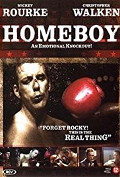
Directed by
Michael Seresin
116 minutes
Rated M
Reviewed by
Bernard Hemingway

Homeboy
Although no-one knew it at the time with Barfly and Angel Heart which were both released the previous year, Mickey Rourke’s career as an A-list actor was behind him when he made this film in which he plays the part of Johnny Walker, an on-his-druthers minor league boxer. His career at a dead-end and suffering from some kind brain impairment Johnny arrives in the beachfront resort of Asbury Park, New Jersey, where he is befriended by a charismatic small-time criminal, Wesley Pendergrass (Christopher Walken), and wins the affections of pretty carny-owner, Ruby (Debra Feuer). Johnny must choose between Wesley and Ruby, that is if boxing doesn't kill him first.
Penned by Rourke using the name Eddie Cook and the sole directorial effort for cinematographer Michael Seresin who had lensed Angel Heart, Homeboy wants to be a laconically romanticised portrait of society’s misfits, people who might have been Leonard Cohen's “beautiful losers”. The elements are there for this, but, the execution, including the score which was composed and performed by Eric Clapton and Michael Kamen, is too formulaic to coalesce into a convincing whole.
For a start there's Rourke, the left side of his face apparently already marred by a real-life boxing injury, who spends the entire movie ambling around bow-leggedly in shabby-chic cowboy gear, chewing his cud, looking like a stroke victim and largely speaking in monosyllables. It’s quite a compelling performance with the camera following him doggedly as he lopes now here, now there but the odd scene when Johnny suddenly becomes quite loquacious, such as when he articulates his love for Ruby to Wesley, doesn’t mesh with the overall portrayal.
Walken’s performance too is eminently watchable but he seems far too charming and good-humored to fit with the milieu and a suggestion that we will see him perform in cabaret-mode largely comes to nothing. The biggest incongruity however is the far-too-comely Debra Feuer (she was married to Rourke at the time). Why a woman of such evident charms would be running a two-bit amusement park, let alone have any interest in a homeless, over-the-hill pug is a nagging question. As for Ruben Bladés as a medico (his acting comes down to putting on a lab coat), well, just forget about it.
Somewhat oddly, the boxing is remarkably un-cinematic, perhaps at Rourke's behest, coming down to brutal slogging. As such it is surprising that Rourke quit acting in 1991 to take up a career as a professional boxer. (He returned to acting in 1994 and was to have a late moment in the sun with an Oscar-nominated performance in Darren Aronofsky’s The Wrestler in 2008).
Want something different?





